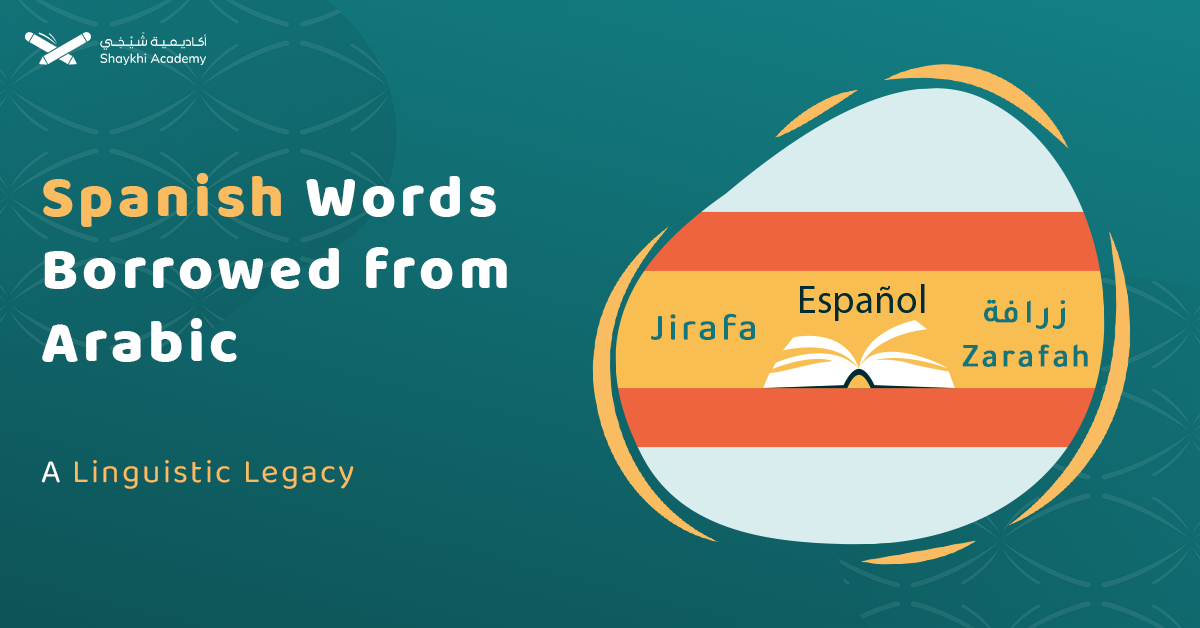The Spanish language is a vivid tapestry woven with threads of history, culture, and linguistic exchange. One of the most significant influences on Spanish vocabulary comes from Arabic, a legacy of nearly eight centuries of Moorish rule in the Iberian Peninsula. From everyday words to terms in science, architecture, and commerce, Arabic has left an indelible mark on Spanish.
This article explores common Spanish words with Arabic origins, categorized to showcase the breadth of this linguistic connection. It also delves into the historical and cultural reasons for this profound influence, offering a window into the rich interactions between two distinct civilizations.
Common Spanish Words from Arabic
The Spanish language contains many words derived from Arabic, primarily due to the influence of the Arabs during their rule of the Iberian Peninsula from 711 to 1492. Here are some notable categories and examples of Spanish words with Arabic origins:
Everyday Spanish Words from Arabic
| # | Spanish Word | Arabic Origin | Transliteration | Meaning |
| 1 | Ojalá | إن شاء الله | in shaa’ Allah | Hopefully, God willing |
| 2 | Hasta | حتى | hatta | Until |
| 3 | Barrio | برّي | barri | Neighborhood |
| 4 | Ajedrez | الشطرنج | al-shatranj | Chess |
Spanish Words of Food and Drink from Arabic
| # | Spanish Word | Arabic Origin | Transliteration | Meaning |
| 5 | Arroz | الرز | al-ruz | Rice |
| 6 | Aceituna | الزيتون | al-zaytoun | Olive |
| 7 | Azúcar | السكر | al-sukkar | Sugar |
| 8 | Naranja | نارنج | naranj | Orange (fruit) |
| 9 | Berenjena | الباذنجان | al-badhinjan | Eggplant |
| 10 | Limón | ليمون | laymoun | Lemon |
Spanish Words from Arabic in Mathematics and Science
| # | Spanish Word | Arabic Origin | Transliteration | Meaning |
| 11 | Cero | صفر | sifr | Zero |
| 12 | Álgebra | الجبر | al-jabr | Algebra |
| 13 | Alquimia | الكيمياء | al-kimiya | Alchemy |
| 14 | Azimut | السمت | al-samt | Azimuth |
Spanish Words from Arabic in Architecture and Design
| # | Spanish Word | Arabic Origin | Transliteration | Meaning |
| 15 | Alcázar | القصر | al-qasr | Fortress, palace |
| 16 | Azulejo | الزليج | al-zillij | Ceramic tile |
| 17 | Almohada | المخدة | al-mikhadda | Pillow |
| 18 | Alhaja | الحاج | al-haja | Jewel |
Spanish Words from Arabic in Nature and Geography
| # | Spanish Word | Arabic Origin | Transliteration | Meaning |
| 19 | Guadalquivir | الوادي الكبير | al-wadi al-kabir | Great river |
| 20 | Acequia | الساقية | al-saqiya | Irrigation canal |
| 21 | Almendra | اللوز | al-lawz | Almond |
| 22 | Jarabe | شراب | sharab | Syrup |
Spanish Words from Arabic in Commerce and Trade
| # | Spanish Word | Arabic Origin | Transliteration | Meaning |
| 23 | Aduana | ديوان | diwan | Customs office |
| 24 | Arancel | الإنزال | al-inzaal | Tariff |
| 25 | Almacén | المخزن | al-makhzan | Warehouse |
| 26 | Fanega | فنكة | faniqa | Measure of grain |
Spanish Words from Arabic In Military Terms
| # | Spanish Word | Arabic Origin | Transliteration | Meaning |
| 27 | Alférez | الفارس | al-faaris | Ensign, lieutenant |
| 28 | Atalaya | الطليعة | al-tali‘a | Watchtower |
| 29 | Alcázar | القصر | al-qasr | Fortress, castle |
Spanish Words from Arabic Related to Tools and Technology
| # | Spanish Word | Arabic Origin | Transliteration | Meaning |
| 30 | Ajarque | الشرج | al-sharj | To chalk or outline |
| 31 | Alfiler | الإبرة | al-ibr | Pin |
| 32 | Alambique | الأنبيق | al-anbiq | Alembic |
General Spanish Words from Arabic
| # | Spanish Word | Arabic Origin | Transliteration | Meaning |
| 33 | Rábida | رباط | ribat | Monastery, hermitage |
| 34 | Albahaca | الريحان | al-rihan | Basil |
| 35 | Alcoba | القبة | al-qubba | Bedroom |
| 36 | Zahén | زَهين | zahin | Clever, intelligent |
| 37 | Almirez | المهراس | al-mihras | Mortar |
| 38 | Zoco | سوق | souq | Market |
| 39 | Albornoz | البرنس | al-burnus | Robe |
| 40 | Mezquita | مسجد | masjid | Mosque |
Why Are There Spanish Words from an Arabic Origin?
The Arabic influence on the Spanish language is a fascinating chapter in linguistic history, rooted in centuries of cultural interaction and exchange. This influence began during the Moorish conquest of the Iberian Peninsula in 711 CE, when Arabic became a dominant language in Al-Andalus.
Over time, Arabic words were absorbed into the local Romance languages, shaping the vocabulary of modern Spanish. From everyday terms to scientific and architectural jargon, these words reflect the profound impact of Arabic-speaking scholars, traders, and administrators.
Taking a systematic Arabic grammar course can help you in understanding why Spanish contains so many words of Arabic origin that requires exploring the historical, cultural, and social factors that brought these two worlds together.
1. The Moorish Conquest and Arabic Influence
Spanish words of Arabic origin stem from the Moorish conquest of the Iberian Peninsula in 711 CE. The Moors, a mix of Arab and Berber Muslims, brought their language and culture to the region, establishing Al-Andalus. Arabic became the dominant language in administration, education, and intellectual pursuits during this era.
2. Al-Andalus as a Cultural Hub
For nearly eight centuries, Al-Andalus thrived as a center of knowledge, art, and science. Arabic-speaking scholars made significant contributions in various fields, such as mathematics, astronomy, agriculture, and medicine. This cultural exchange led to the incorporation of many Arabic words into the local languages.
3. Everyday Interaction Between Cultures
The coexistence of Muslims, Christians, and Jews in Al-Andalus facilitated linguistic borrowing. Arabic words naturally entered the vocabulary of the local Romance-speaking populations due to trade, governance, and daily interactions. Common terms like arroz (rice) and aceituna (olive) reflect this exchange.
4. The Christian Reconquista and Lingering Influence
Even after the Christian Reconquista ended Muslim rule in 1492, Arabic’s influence on Spanish persisted. Words related to science, architecture, and daily life remained in use, demonstrating the deep integration of Arabic into the Spanish language.
5. A Linguistic Legacy of Exchange
Today, over 4,000 Spanish words have Arabic roots, highlighting the enduring impact of this historical period. These words are a reminder of the rich cultural and intellectual exchanges that shaped Spain’s history and language.
Master Arabic Grammar with Shaykhi Academy!
Unlock the power of the Arabic language with Shaykhi Academy’s Arabic Grammar Course! Whether you’re a beginner or looking to deepen your understanding, this course offers expert guidance to help you master Arabic grammar step-by-step. Enhance your reading, writing, and comprehension skills with personalized instruction from experienced teachers. Don’t wait—take the first step toward fluency in Arabic today.
Enroll Now and Start Learning!
Why Shaykhi Academy?
- Expert Native Tutors: Learn from highly qualified native Arabic speakers.
- Flexible Scheduling: Tailor your classes to fit your busy life.
- Affordable Learning: Access top-quality education at a price that suits you.
- Global Access: Study from anywhere in the world.
Explore Our Arabic Courses:
- Noorani Qaida: Build a strong foundation in Quranic Arabic.
- Comprehensive Arabic Courses: Master the Arabic language, from beginner to advanced levels.
- Fusha Arabic Classes: Delve into Modern Standard Arabic, the key to understanding literature, media, and formal communication across the Arab world.
- Quranic Arabic Course: Enhance your connection with the Quran by learning the language in which it was revealed.
Start Your Arabic Journey Today! Whether you’re just starting or looking to deepen your knowledge, Shaykhi Academy is here to support your journey. Book your free trial now and begin your path to Arabic mastery!

The Conclusion:
The influence of Arabic on the Spanish language is a testament to the dynamic interactions between cultures over centuries. The thousands of Arabic-derived words in Spanish not only enrich its vocabulary but also serve as a linguistic bridge to a shared historical past. They reflect the scientific advancements, cultural exchanges, and day-to-day interactions of the Al-Andalus period.
Recognizing these Arabic contributions to Spanish fosters a deeper appreciation for the diversity and interconnectedness of human history, reminding us of the powerful role language plays in preserving the legacy of cultural exchange.

















































